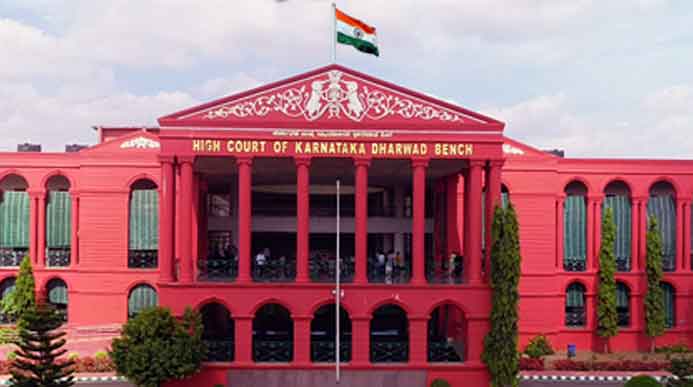The Karnataka High Court has urged an amendment to Section 184 of the Indian Civil Security Code (BNSS), advocating that only female doctors examine rape victims to uphold their right to privacy.
Introduction
INVC NEWS
New Delhi : The Karnataka High Court has made a pivotal ruling that could significantly impact the way rape cases are handled in India. Emphasizing the right to privacy for rape victims, the court has urged the Central Government to amend Section 184 of the Indian Civil Security Code (BNSS). This amendment would ensure that only female doctors conduct medical examinations of rape victims, creating a more sensitive and respectful process.
The High Court’s Decision: A Call for Change
Justice MG Uma, presiding over a single bench, directed both the central and state governments to take immediate steps to ensure that medical examinations of rape victims are conducted by female doctors. Until such an amendment is made, it is mandated that these examinations be performed under the supervision of a registered female doctor. This decision stems from a broader need to address the sensitive nature of such cases and to protect the dignity and privacy of the victims.
Urgency of the Amendment
The court’s directive underscores the urgency of amending Section 184 of the BNSS. This legal change is not just a procedural modification but a crucial step towards ensuring that rape victims are treated with the utmost sensitivity and respect. The court emphasized that this measure is necessary to prevent further trauma to victims during the medical examination process.
A Closer Look at the Case
The ruling came in the context of the bail plea of Ajay Kumar Bhera, accused of rape and attempted murder. Justice Uma pointed out that a male medical officer had conducted the victim’s medical examination, which lasted for about six hours, without providing any explanation or opinion. This oversight highlighted the need for a victim-friendly examination process that respects the privacy and dignity of the victim.
The Importance of Privacy for Rape Victims
Rape is a profoundly traumatic experience, and the way victims are treated during the investigation and medical examination can significantly impact their recovery and willingness to seek justice. The High Court’s decision brings to the forefront the critical issue of privacy for rape victims, asserting that their rights must be protected at every stage of the legal and medical processes.
Why Privacy Matters
Privacy is a fundamental right, and for rape victims, it is even more crucial. The invasive nature of medical examinations can be retraumatizing, and having a male doctor conduct such an examination can exacerbate the victim’s distress. Ensuring that only female doctors are involved can make the process less intimidating and more respectful of the victim’s dignity.
Psychological Impact
The psychological impact of rape is profound, and every effort should be made to minimize additional trauma. A sensitive approach that respects the victim’s privacy can aid in their healing process and foster a sense of safety and support. The court’s ruling is a step towards creating a more compassionate and victim-centered system.
Educating and Sensitizing Stakeholders
The High Court’s decision also includes a directive to educate and sensitize all stakeholders involved in handling rape cases. This includes police officers, prosecutors, doctors, medical personnel, and judicial officers. The aim is to ensure that everyone involved understands the importance of dealing with rape victims with sensitivity and respect.
Comprehensive Training Programs
To implement this directive effectively, comprehensive training programs need to be developed. These programs should cover:
- Understanding Trauma: Educating stakeholders about the psychological impact of rape and how to provide support.
- Privacy Protocols: Establishing clear protocols to ensure the privacy and dignity of the victim are upheld at all times.
- Victim-Centered Approach: Training on how to adopt a victim-centered approach in investigations and medical examinations.
Role of Medical Personnel
Medical personnel play a crucial role in the aftermath of a rape. They are often the first point of contact for the victim and their approach can set the tone for the entire process. Training programs should focus on:
- Sensitive Examination Techniques: Teaching techniques that are respectful and minimize discomfort.
- Effective Communication: Ensuring that medical personnel communicate effectively and empathetically with victims.
Ensuring Compliance: Government’s Role
The High Court has placed the onus on both the central and state governments to ensure compliance with its directive. This involves not only amending the relevant laws but also implementing practical measures to enforce them.
Monitoring and Evaluation
To ensure that the new protocols are followed, a robust system of monitoring and evaluation needs to be established. This could include:
- Regular Audits: Conducting regular audits of medical examinations to ensure they are conducted by female doctors.
- Feedback Mechanisms: Setting up mechanisms for victims to provide feedback on their experience, which can be used to improve the process.
Collaboration with NGOs
Non-Governmental Organizations (NGOs) that work with rape victims can play a vital role in ensuring the new protocols are followed. Collaborating with NGOs can help:
- Provide Support: Offering support to victims throughout the process.
- Raise Awareness: Raising awareness about the new protocols and the rights of rape victims.
The Karnataka High Court’s decision to advocate for only female doctors to examine rape victims marks a significant step towards creating a more compassionate and respectful process for handling rape cases. By emphasizing the right to privacy and the need for sensitivity, the court has highlighted a crucial aspect of victim support that can aid in their recovery and pursuit of justice. The directive to amend Section 184 of the BNSS and educate all stakeholders involved is a comprehensive approach to ensuring that rape victims are treated with the dignity and respect they deserve. This landmark decision not only sets a precedent but also paves the way for more victim-centered practices in the legal and medical fields.
















